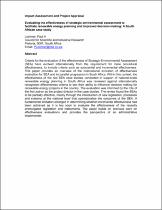 ResearchSpace
ResearchSpace
Evaluating the effectiveness of strategic environmental assessment to facilitate renewable energy planning and improved decision-making: A South African case study
JavaScript is disabled for your browser. Some features of this site may not work without it.
- ResearchSpace
- →
- Research Publications/Outputs
- →
- Journal Articles
- →
- View Item
| dc.contributor.author |
Fischer, D

|
|
| dc.contributor.author |
Lochner, Paul A

|
|
| dc.contributor.author |
Annegarn, H

|
|
| dc.date.accessioned | 2019-09-25T08:31:15Z | |
| dc.date.available | 2019-09-25T08:31:15Z | |
| dc.date.issued | 2019-05 | |
| dc.identifier.citation | Fischer, D., Lochner, P.A. & Annegarn, H. 2019. Evaluating the effectiveness of strategic environmental assessment to facilitate renewable energy planning and improved decision-making: A South African case study. Impact Assessment and Project Appraisal, pp.11 | en_US |
| dc.identifier.issn | 1461-5517 | |
| dc.identifier.issn | 1471-5465 | |
| dc.identifier.uri | https://www.tandfonline.com/doi/full/10.1080/14615517.2019.1619389 | |
| dc.identifier.uri | doi.org/10.1080/14615517.2019.1619389 | |
| dc.identifier.uri | http://hdl.handle.net/10204/11133 | |
| dc.description | Copyright: 2019. Taylor & Francis. This is an abstract. The definitive version of the work is published in the journal Impact Assessment and Project Appraisal, pp 1- 11 | en_US |
| dc.description.abstract | Criteria for the evaluation of the effectiveness of Strategic Environmental Assessment (SEA) have evolved internationally from the requirement for mere procedural effectiveness, to include criteria such as substantial and incremental effectiveness. This paper provides an overview of the international evolution of effectiveness evaluation for SEA and its parallel progression in South Africa. Within this context, the effectiveness of the two SEA case studies conducted in support of national-scale renewable energy planning in South Africa was reviewed against internationally recognised effectiveness criteria to test their ability to influence decision making for renewable energy projects in the country. The evaluation was informed by the role of the first author as the project director in the case studies. The review found the SEAs to be partially effective, mainly through the introduction of new legislation, processes and systems at the national level that operationalise the outcomes of the SEA. A fundamental limitation emerged in determining whether incremental effectiveness had been achieved as it is too soon to evaluate the effectiveness of the recently promulgated legislation and instruments. The paper builds on previous work on effectiveness evaluations and provides the perspective of an administrative implementer. | en_US |
| dc.language.iso | en | en_US |
| dc.relation.ispartofseries | Workflow;22529 | |
| dc.subject | Strategic environmental assessment | en_US |
| dc.subject | SEA | en_US |
| dc.subject | Renewable energy | en_US |
| dc.subject | Effectiveness criteria | en_US |
| dc.subject | Decision-making | en_US |
| dc.title | Evaluating the effectiveness of strategic environmental assessment to facilitate renewable energy planning and improved decision-making: A South African case study | en_US |
| dc.type | Article | en_US |
| dc.identifier.apacitation | Fischer, D., Lochner, P. A., & Annegarn, H. (2019). Evaluating the effectiveness of strategic environmental assessment to facilitate renewable energy planning and improved decision-making: A South African case study. http://hdl.handle.net/10204/11133 | en_ZA |
| dc.identifier.chicagocitation | Fischer, D, Paul A Lochner, and H Annegarn "Evaluating the effectiveness of strategic environmental assessment to facilitate renewable energy planning and improved decision-making: A South African case study." (2019) http://hdl.handle.net/10204/11133 | en_ZA |
| dc.identifier.vancouvercitation | Fischer D, Lochner PA, Annegarn H. Evaluating the effectiveness of strategic environmental assessment to facilitate renewable energy planning and improved decision-making: A South African case study. 2019; http://hdl.handle.net/10204/11133. | en_ZA |
| dc.identifier.ris | TY - Article AU - Fischer, D AU - Lochner, Paul A AU - Annegarn, H AB - Criteria for the evaluation of the effectiveness of Strategic Environmental Assessment (SEA) have evolved internationally from the requirement for mere procedural effectiveness, to include criteria such as substantial and incremental effectiveness. This paper provides an overview of the international evolution of effectiveness evaluation for SEA and its parallel progression in South Africa. Within this context, the effectiveness of the two SEA case studies conducted in support of national-scale renewable energy planning in South Africa was reviewed against internationally recognised effectiveness criteria to test their ability to influence decision making for renewable energy projects in the country. The evaluation was informed by the role of the first author as the project director in the case studies. The review found the SEAs to be partially effective, mainly through the introduction of new legislation, processes and systems at the national level that operationalise the outcomes of the SEA. A fundamental limitation emerged in determining whether incremental effectiveness had been achieved as it is too soon to evaluate the effectiveness of the recently promulgated legislation and instruments. The paper builds on previous work on effectiveness evaluations and provides the perspective of an administrative implementer. DA - 2019-05 DB - ResearchSpace DP - CSIR KW - Strategic environmental assessment KW - SEA KW - Renewable energy KW - Effectiveness criteria KW - Decision-making LK - https://researchspace.csir.co.za PY - 2019 SM - 1461-5517 SM - 1471-5465 T1 - Evaluating the effectiveness of strategic environmental assessment to facilitate renewable energy planning and improved decision-making: A South African case study TI - Evaluating the effectiveness of strategic environmental assessment to facilitate renewable energy planning and improved decision-making: A South African case study UR - http://hdl.handle.net/10204/11133 ER - | en_ZA |





